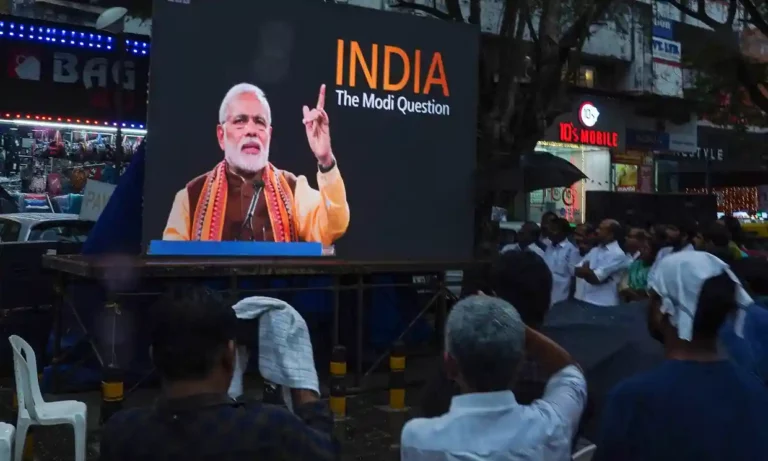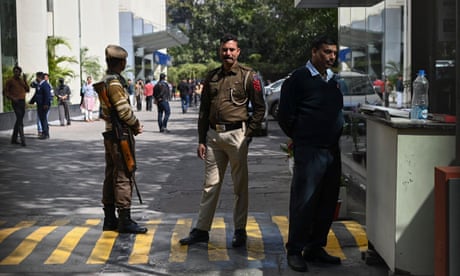
India: the Modi Question’, examining 2002 sectarian riots, comes at sensitive time for prime minister
Image: The two-part series scrutinises the actions of Narendra Modi during the riots, in which more than 1,000 people, mostly Muslims, were killed. Photograph: Arun Chandrabose/AFP/Getty Images
A BBC documentary on the Indian prime minister, Narendra Modi’s, actions during deadly sectarian riots in 2002 continues to cause controversy, with the British broadcaster’s offices raided by India’s tax officials on Tuesday. What is the documentary and why has it proved so contentious?
What is the BBC documentary about?
The documentary, India: the Modi Question, is a two-part series examining the rising tensions between the Indian prime minister and the country’s Muslim minority that aired in the UK in January.

Since Modi was elected in 2014, his Bharatiya Janata party (BJP) government has pursued Hindu-centric policies that have been accused of targeting and discriminating against India’s 200 million Muslims as part of a rightwing religious nationalist agenda that is moving India away from its secular foundations.
The first episode of the documentary revisits allegations from two decades ago, when Modi was chief minister of Gujarat. It was during this time that 60 Hindu pilgrims were killed when their train carriage was set alight. The cause of the fire was disputed but the Muslim community was blamed and it set off a wave of bloody retaliatory violence, with Hindu mobs targeting the homes of Muslims across the state. More than 1,000 people died in the riots, most of them Muslims.
In the aftermath, Modi’s state government was accused of complicity in the violence by encouraging the Hindu mobs and directing the police to stand aside as Muslim households were attacked. The allegations of his role in the communal violence have dogged Modi for years, leading to him being banned from the US owing to “very serious” doubts over the part he had played.
In 2012, Modi was cleared of complicity in the violence by a Special Investigation Team (SIT) appointed by the supreme court of India, after they could not find adequate evidence, a verdict that was upheld in 2022. After he was elected as prime minister in 2014, Modi’s US visa ban was lifted.
What new material has the documentary uncovered?
For those who have closely followed Indian news, the allegations in the documentary surrounding Modi and the Gujarat riots are nothing new, having been well-reported in media at the time, as well as documented in numerous books since. However, for international audiences who are less familiar with Modi before he became prime minister, it was one of the first to revisit the whole trajectory of Modi’s rise to power, the controversies that have surrounded it and how they play into his current government agenda.
The documentary obtained access to a previously unseen and confidential UK government report produced after the riots that found Modi responsible for the violence and described the riots as having the “hallmarks of ethnic cleansing”. The documentary also featured a damning interview with Jack Straw, UK foreign secretary at the time.
“These were very serious claims that Mr Modi had played a proactive part in pulling back police and in tacitly encouraging the Hindu extremists,” said Straw. “That was a particularly egregious example of political involvement to prevent police from doing their job to protect the Hindus and the Muslims.”
How has the Indian government responded?
The response by the Modi government was quick and forthright in its condemnation. In the foreign ministry’s weekly press conference, a spokesperson said the “bias and lack of objectivity and frankly continuing colonial mindset are blatantly visible” and accused the BBC of pursuing an anti-government agenda.
Kanchan Gupta, an adviser to the ministry of information and broadcasting, issued an even stronger rebuke, calling it “propaganda and anti-India garbage, disguised as documentary”.

Not long after, the government invoked emergency laws to ban links and clips of the documentary from being shared online, which YouTube and Twitter complied with. It is not the first time the law has been deployed to block online content critical of the government over the past year, but it is the most high profile.
Several BJP politicians accused the BBC of having an anti-Modi agenda in revisiting allegations that were two decades old and that the courts had dismissed. A petition was filed in the supreme court calling for the BBC to be banned from operating in India, which was dismissed.
In response to the apparent censorship, student groups across India set up screenings of the documentary but had to face arrest, violence by rightwing groups and accusations of “treason”.
The BBC has stood by the documentary, calling it “rigorously researched according to highest editorial standards”.
Why has it caused such an outcry from the Indian government?
The documentary comes at a highly sensitive time for India in terms of its placement on the world stage. It is currently hosting the G20, presenting itself as the “mother of democracy”. As the world’s second – now likely first – largest country, with an economy bigger than the UK’s, Modi is increasingly being courted by western powers on questions of geopolitics and the environment, and his growing international prominence is a vote winner at home.
However, the BBC documentary highlights alleged past atrocities and current discrimination against minorities that the US, UK and Europe have recently been accused of turning a blind eye to as they strike trade deals and close alliances with India, which could create complications for these relationships in future.
Accusations have abounded in India that old colonial powers in the west, uncomfortable with India’s rise, are attempting to stymie its prominence by bringing up old allegations.
India will have a general election next year. Though most expect Modi to win because of his vast popularity – in particular among the Hindu majority who make up 80% of the population – it is still a critical moment for the government.
The Modi government has also been notoriously thin-skinned about international criticism. Among those rebuked for speaking out are Greta Thunberg, the climate activist, and the singer Rihanna, who both expressed support for farmers protesting against Modi’s policies and who were subsequently the subject of a damning foreign ministry statement.
What have been the implications for the BBC?
Pro-government media outlets and influential rightwing social media accounts in India began to attack the BBC for its alleged bias.
Although the documentary was well received in the UK, with the Guardian calling it a “a sobering look at Narendra Modi’s treatment of India’s Muslims”, questions were also raised in some quarters.
Bob Blackman, a Conservative MP with close ties to the Modi government who in 2020 was awarded India’s highest honour, called the documentary a “hatchet job” while Rami Ranger, a member of the House of Lords, wrote to the head of the BBC to complain about the film, demanding to know “if your Pakistani-origin staff were behind this nonsense”. The Labour MP Chris Elmore said that for the Tory peer to “put pressure on the BBC in this way is unacceptable”, and called Ranger’s comments about Pakistani journalists “racially charged” and “deplorable”.
On Tuesday, more than a dozen officers from the government’s tax department office raided the offices of the BBC in Mumbai and New Delhi, describing it as a “survey” of operations. Phones and laptops were taken and the offices were sealed as part of a tax evasion investigation, which many viewed as retaliatory action.
The BBC said in a briefly worded statement that it was cooperating with the investigation.
Human rights organisations and press bodies responded to the raids with strongly worded statements. “Indian authorities have used tax investigations as a pretext to target critical news outlets before, and must cease harassing BBC employees immediately, in line with the values of freedom that should be espoused in the world’s largest democracy,” said Beh Lih Yi, Asia coordinator of the Committee to Protect Journalists.
… we have a small favour to ask. Tens of millions have placed their trust in the Guardian’s fearless journalism since we started publishing 200 years ago, turning to us in moments of crisis, uncertainty, solidarity and hope. More than 1.5 million supporters, from 180 countries, now power us financially – keeping us open to all, and fiercely independent. Will you make a difference and support us too?
Unlike many others, the Guardian has no shareholders and no billionaire owner. Just the determination and passion to deliver high-impact global reporting, always free from commercial or political influence. Reporting like this is vital for democracy, for fairness and to demand better from the powerful.
And we provide all this for free, for everyone to read. We do this because we believe in information equality. Greater numbers of people can keep track of the global events shaping our world, understand their impact on people and communities, and become inspired to take meaningful action. Millions can benefit from open access to quality, truthful news, regardless of their ability to pay for it.
Whether you give a little or a lot, your funding will power our reporting for the years to come. If you can, please support us on a monthly basis from just $2. It takes less than a minute to set up, and you can rest assured that you’re making a big impact every single month in support of open, independent journalism. Thank you.
Source: https://www.theguardian.com/world/2023/feb/14/why-is-bbc-report-on-narendra-modis-handling-of-sectarian-riots-in-2002-so-controversial

